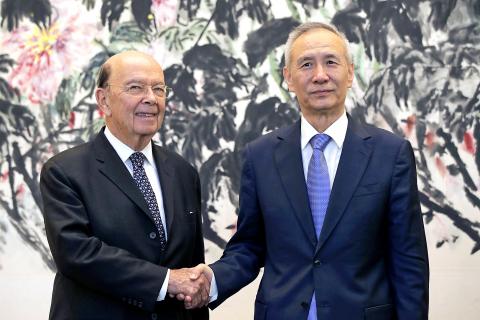China yesterday warned after another round of talks on a sprawling trade dispute with Washington that any deals they produce “will not take effect” if US President Donald Trump’s threatened tariff hike on Chinese goods goes ahead.
The warning came after delegations led by US Secretary of Commerce Wilbur Ross and China’s top economic official, Vice Premier Liu He (劉鶴), wrapped up a meeting on Beijing’s pledge to narrow its trade surplus.
Ross said at the start of the event that they had discussed specific US exports China might purchase, but the talks ended with no joint statement and neither side released details.

Photo: AP
The White House threw the meeting’s status into doubt on Tuesday by renewing a threat to impose 25 percent tariffs on US$50 billion of Chinese high-tech goods in response to complaints Beijing steals or pressures foreign companies to hand over technology.
The event went ahead despite that, but Beijing said it reserved the right to retaliate.
“If the United States introduces trade sanctions, including a tariff increase, all the economic and trade achievements negotiated by the two parties will not take effect,” said the Chinese statement, carried by Xinhua news agency.
The negotiating process should be “based on the premise” of not fighting a “trade war,” the statement said.
The US embassy in Beijing did not immediately respond to a request for comment.
Trump is pressing Beijing to narrow its politically volatile trade surplus with the US, which reached a record US$375.2 billion last year.
Tensions eased after China promised on May 19 to “significantly increase” purchases of farm goods, energy and other products and services following the last round of talks in Washington.
US Secretary of the Treasury Steven Mnuchin said the dispute was “on hold” and the tariff hike would be postponed.
That truce appeared to end with Tuesday’s surprise announcement.
Private sector analysts say that while Beijing is willing to compromise on its trade surplus, it will resist changes that might threaten plans to transform China into a global technology competitor.
Ross was accompanied by agriculture, Treasury and trade officials for the meeting at the Diaoyutai State Guesthouse. Liu’s delegation included People’s Bank of China Governor Yi Gang (易綱) and the minister of commerce.
Ross and Liu held a working dinner on Saturday.
“Our meetings so far have been friendly and frank, and covered some useful topics about specific export items,” said Ross at the opening of yesterday’s meeting.

Seventy percent of middle and elementary schools now conduct English classes entirely in English, the Ministry of Education said, as it encourages schools nationwide to adopt this practice Minister of Education (MOE) Cheng Ying-yao (鄭英耀) is scheduled to present a report on the government’s bilingual education policy to the Legislative Yuan’s Education and Culture Committee today. The report would outline strategies aimed at expanding access to education, reducing regional disparities and improving talent cultivation. Implementation of bilingual education policies has varied across local governments, occasionally drawing public criticism. For example, some schools have required teachers of non-English subjects to pass English proficiency

‘FORM OF PROTEST’: The German Institute Taipei said it was ‘shocked’ to see Nazi symbolism used in connection with political aims as it condemned the incident Sung Chien-liang (宋建樑), who led efforts to recall Democratic Progressive Party (DPP) Legislator Lee Kun-cheng (李坤城), was released on bail of NT$80,000 yesterday amid an outcry over a Nazi armband he wore to questioning the night before. Sung arrived at the New Taipei City District Prosecutors’ Office for questioning in a recall petition forgery case on Tuesday night wearing a red armband bearing a swastika, carrying a copy of Adolf Hitler’s Mein Kampf and giving a Nazi salute. Sung left the building at 1:15am without the armband and apparently covering the book with a coat. This is a serious international scandal and Chinese

TRADE: The premier pledged safeguards on ‘Made in Taiwan’ labeling, anti-dumping measures and stricter export controls to strengthen its position in trade talks Products labeled “made in Taiwan” must be genuinely made in Taiwan, Premier Cho Jung-tai (卓榮泰) said yesterday, vowing to enforce strict safeguards against “origin laundering” and initiate anti-dumping investigations to prevent China dumping its products in Taiwan. Cho made the remarks in a discussion session with representatives from industries in Kaohsiung. In response to the US government’s recent announcement of “reciprocal” tariffs on its trading partners, President William Lai (賴清德) and Cho last week began a series of consultations with industry leaders nationwide to gather feedback and address concerns. Taiwanese and US officials held a videoconference on Friday evening to discuss the

PERSONAL DATA: The implicated KMT members allegedly compiled their petitions by copying names from party lists without the consent of the people concerned Judicial authorities searched six locations yesterday and questioned six people, including one elderly Chinese Nationalist Party (KMT) member and five KMT Youth League associates, about alleged signature forgery and fraud relating to their recall efforts against two Democratic Progressive Party (DPP) legislators. After launching a probe into alleged signature forgery and related fraud in the KMT’s recall effort, prosecutors received a number of complaints, including about one petition that had 1,748 signatures of voters whose family members said they had already passed away, and also voters who said they did not approve the use of their name, Taipei Deputy Chief Prosecutor